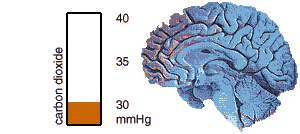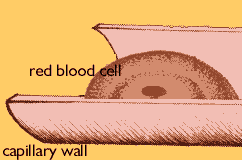In A Nutshell
Asthmatics breathe on average about twice as much air as they should. This cools and dries the airways making them
Continue readingAsthmatics over-breathe. This means breathing heavily, rapidly or through the mouth when there is no need for it. We all know that breathing plays a vital role in the human organism. What we are probably unaware of is that overbreathing does not mean good breathing, anymore than eating excessively means good nutrition. This overbreathing often occurs unconsciously, resulting in irritation, inflammation and constriction of the airways.
This section explains how and why we breathe, how your breathing gives you asthma and what Buteyko does about it.
Breathing has 2 main purposes:
1. to provide the body with oxygen
2. to remove excess carbon dioxide
Our body needs oxygen in order to survive. The air around us contains oxygen & so we breathe. When we inhale during the process of respiration, oxygen travels to the lungs when it is collected by haemoglobin (a chemical in the blood). Oxygen is moved around the body in the body by haemoglobin, which releases it to the body’s tissues where it is needed.
The tissue cells use oxygen in their energy reactions, producing carbon dioxide & water as a result. Carbon dioxide is needed for every metabolic process and the excess is carried in the bloodstream back to the lungs where it is exhaled along with water vapour.
The Role of Carbon Dioxide
The importance of oxygen in the body is well known. What isn’t well known is how vital carbon dioxide is to bodily function:

Carbon dioxide is the main regulator of respiration, controlling the rate & depth of breathing. When carbon dioxide levels in the bloodstream reach a certain point, the respiratory centre in our brain sends a message to the muscles used for breathing to take in more air and breathe out excess carbon dioxide.

The amount of oxygen released from haemoglobin is determined by carbon dioxide levels. High carbon dioxide levels leads to an increase of oxygen in the cells; low carbon dioxide decreases the oxygen uptake because the haemoglobin will not easily release the oxygen. This is known as the Bohr effect and basically means that the more you breathe, the less oxygen your body is actually able to use.
Carbon dioxide regulates the activity of the autonomic nervous system. If carbon dioxide is low, it stimulates the sympathetic nervous system putting the body on red alert. This causes erratic, breathing.
Carbon dioxide regulates smooth muscle or the involuntary muscle of the airways, blood vessels etc. Low levels of carbon dioxide cause smooth muscle to constrict and spasm.
Carbon dioxide maintains the acid/alkaline balance (pH) of the blood. Low levels of carbon dioxide cause “respiratory alkalosis” and the body produces lactic acid to counteract this.
The goal of the respiratory centre is to maintain and regulate our breathing so that blood carbon dioxide levels are normal and our pH levels are normal. However, hyperventilation interferes with this balance.
Asthmatics breathe on average about twice as much air as they should. This cools and dries the airways making them
Continue readingFor people with asthma and chronic hyperventilation, restoring a normal breathing pattern takes time and concentration. The Buteyko program is
Continue readingThe theoretical background to the Buteyko Breathing Method links overbreathing (hyperventilation) and hypocapnia (low oxygen) with asthma, since low levels
Continue readingHyper = too much Ventilation = breathing Hyperventilation (HV) simply means breathing more than the body needs to at this
Continue reading